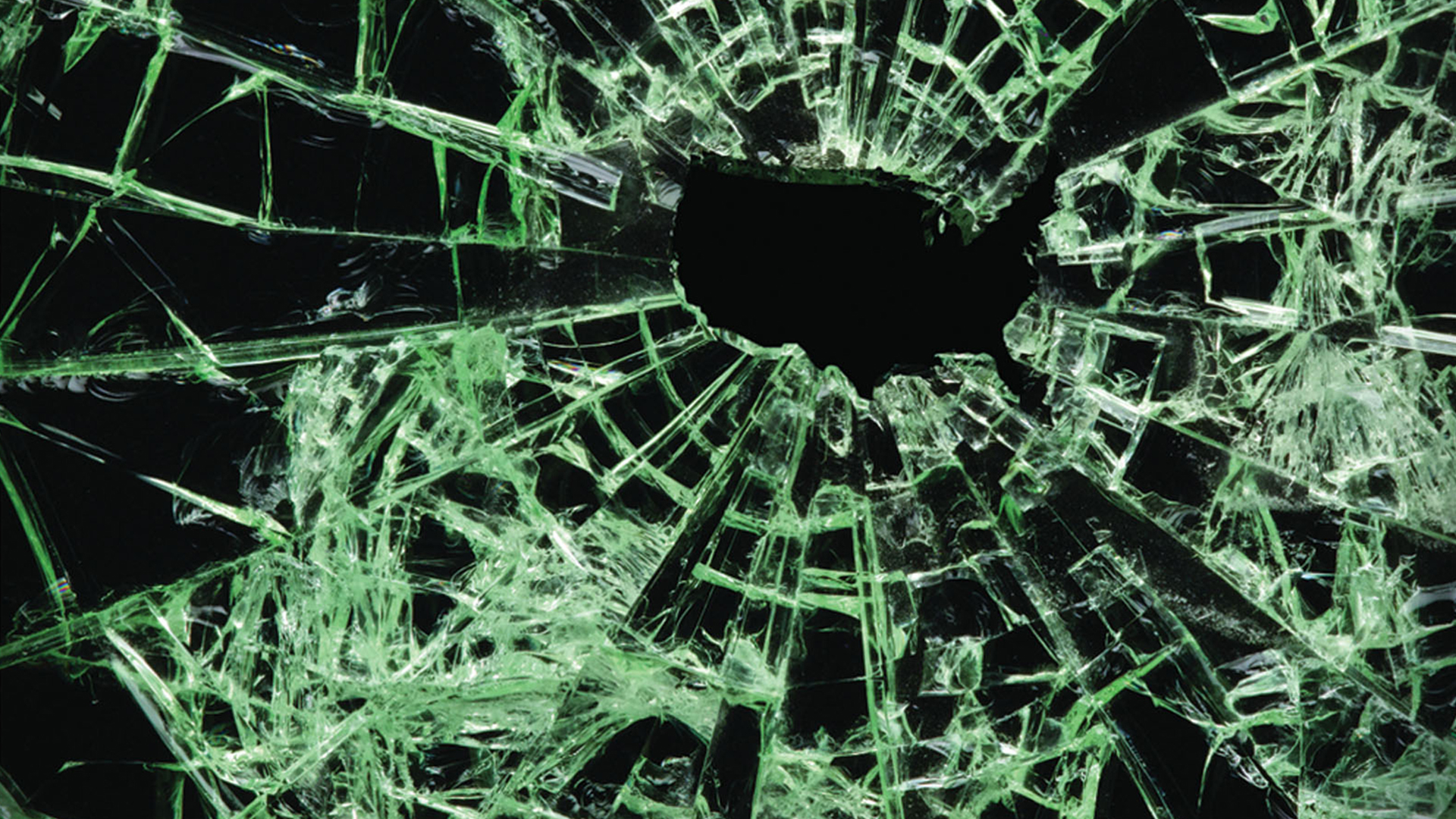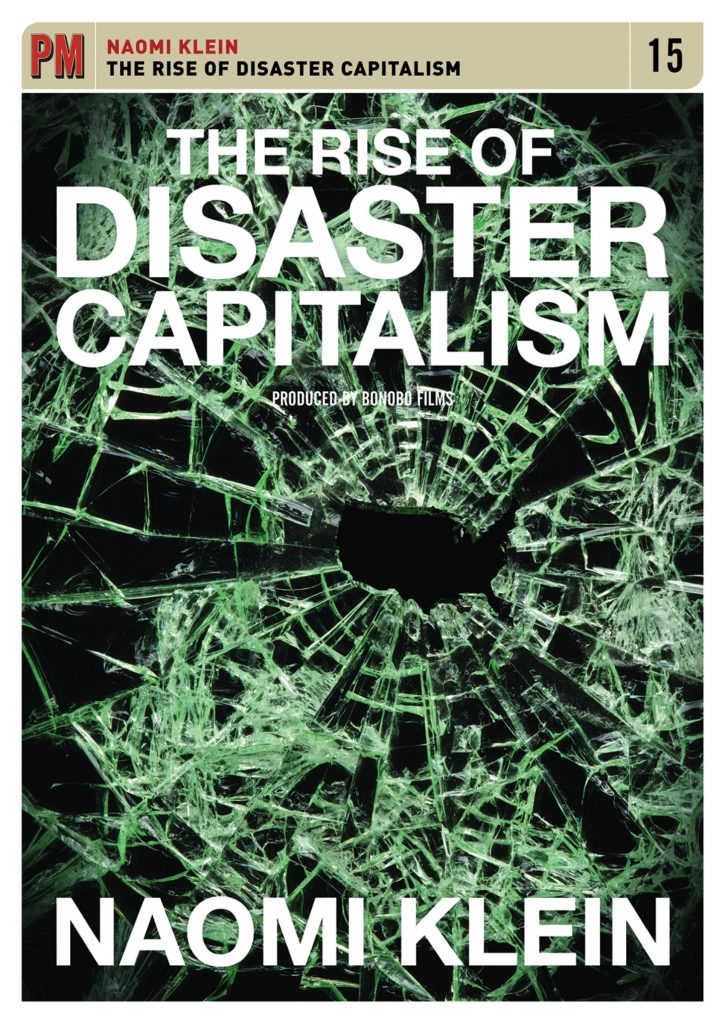By Bill Templer
Political Media Review
University of Malaya
Investigative journalist Naomi Klein speaking on “The Rise of Disaster Capitalism” is a PM Press DVD produced by Bonobo Films.
It consists of a brilliant 65-minute talk Naomi gave on May 19, 2008 at the Friends Meeting House in London introducing the paperback edition of her book The Shock Doctrine: The Rise of Disaster Capitalism (New York, 2007), plus a remarkably insightful 10-minute interview with Naomi done in London the next day. Some sections of the talk are on youtube (1), but the whole is not, and is worth having in its entirety.
The talk was part of a fundraiser organized by the ‘Hands Off Iraqi Oil’ coalition (very active in 2007-2008, http://www.handsoffiraqioil.org/), along with activists from the Britain-based ‘War on Want’ associated with Hands Off Iraqi Oil, and many other anti-war and environmental groups. War on Want is a non-profit organization long committed to the struggle against neoliberal globalization, world poverty, Israeli apartheid and much more (www.waronwant.org).
Many of you will know Naomi’s book, and its thesis of how casino capitalism in its present phase is using ‘shock’ tactics — from 9/11 and the ‘war on terror,’ to natural disasters like the Dec. 2004 tsunami, Katrina, resource wars in West Asia, the serial disasters of climate change — as a platform for taking over markets, raking in spectacular profits, extending corporate control in the wake of disaster and its aftermath, and the “collective vertigo” it often leaves people in. For Naomi, “The market is the disaster itself and the response to it,” emphasizing the utter bankruptcy of the current economic model, a “class war waged by the rich against the poor,” and the need for “deep democracy” and a people’s alternative.
In the states, she stresses, 9/11 is key to understanding how we got to where we are […] People know they’ve been living the ‘shock doctrine’ since Sept. 11. That shock, that blow to the psyche of this country, was expertly harnessed by the administration to push through policies that they could not push through otherwise (2).
In the May 2008 interview on the DVD, Naomi emphasizes that she wrote the book:
precisely to make people more resistant to the shock doctrine I hope the book would be a kind of ‘shock shield’ in a way, because these tactics are all about lack of information and disorientation, What we need to get out of shock is a story, a narrative that explains what is happening around you.
The most ‘opportune time’ for deregulation and neoliberal restructuring, Naomi convincingly argues, is during severe crisis and its aftermath. And the architects of such free marketeering in the midst of chaos – the “privatization of disaster response” — know how to rationalize their greed full well, putting a ‘moral veneer’ on their rapaciousness. Naomi begins her talk with data from a 2008 empirical study on how corporate execs and conservatives are very good at ‘rationalizing’ inequality to justify their own actions, part of their own “ideological tranquillizer,” the psychology of guiltless greed.
The London talk centers more on theses and facts drawn from the Part 5 of the book: “Shocking Times: The Rise of the Disaster Capitalism Complex,” Part 6 “Iraq Full Circle; Overshock,” Part 7 “The Movable Green Zone: Bugger Zones and Blast Walls,” and the conclusion “Shock Wears Off: The Rise of People’s Reconstruction.” Naomi also talks a lot about what’s happening in New Orleans by big capital developers, a “city that’s been stolen,” where public housing has been destroyed to make way for expensive new condos, and charter schools are enjoying a huge boom. Not in her book is a whole section in the London talk on crony capitalism in Burma and the push there in 2008 by the military junta to sell of much of the state-owned economy, and push privatization of prime agricultural land in the wake of the powerful cyclone that ravaged the coast, exemplifying what could be a neoliberal catchphrase across the crisis-ravaged planet: “the more people die, the more land there is to grab.”
These past months, the BP oil spill and its aftermath (3), the record heat and fires in western Russia and the incredible monsoon flooding across much of northwestern Pakistan are prime examples of serial crises of ‘extreme weather events’ multiplying under our eyes. What big bucks will be made off these crises, what new development projects railroaded through? Naomi’s thesis will be reflected there too. As well as the idea that when most people respond to a disaster, it’s the expression of mutual aid, helping each other — not profiteering or looting. People show incredible resilience in the face of disasters. Disaster capitalists tend to see just the opposite of that: a blank slate, a clean sheet, an opportunity to invest and earn big profits.
The core idea for the book was sparked in part by the collapse of the Argentinian economy, which she experienced directly, and the “shock and awe” attack on Iraq and what has ensued there since. Her concrete vision of people’s alternatives touched on in the book briefly and at the end of the London talk was shaped by “the movement of ‘recovered companies,’ two hundred bankrupt businesses that have been resuscitated by their workers, who have turned them into democratically run cooperatives” in Argentina.
She and Avi Lewis made a powerful documentary film The Take (2004) about this movement, though the film goes unmentioned in her book. You can download it cost-free and show widely, to students and activists (4). Naomi likes to see such indigenous responses by working people to the violent inroads of Capital as a form of what a New Orleans activist friend of hers calls “disaster collectivism,” the art of resilience in solidarity.
At the end of her talk and the very end of the book, Naomi highlights efforts by indigenous Thai ‘stateless’ fisher communities along the Andaman Sea coast, known as Moken or Chao Lay, who spearheaded a people’s movement to reclaim their own ‘undocumented’ land by direct action and rebuild their own settlements, a people’s resistance to the corporate developers poised to move in, She notes: “a manifesto drafted by a coalition of Thai tsunami survivor communities explains the philosophy: ‘The rebuilding work should be done by local communities themselves, as much as possible. Keep contractors out, let communities take responsibility for their own housing” (Klein, 2007, p. 465). A year after Katrina, activists from New Orleans met with Thais in the grassroots reconstruction efforts, and told them: “In New Orleans, we’re waiting around on the government to do things for us, but here you all are doing by yourselves […] When we go back, your model is our new goal” (5).
Naomi also reminds us that resistance to neoliberalism has been led by indigenous groups in Latin America, like the Zapatistas. I think that her entire argument, and several strands of analysis on the broader left, would be strengthened by looking in depth at the work of political anthropologist James C. Scott, in particular his most recent study The Art of Not Being Governed: An Anarchist History of Upland Southeast Asia (2009), and his earlier path-breaking studies (6). Scott’s ideas on how simple people resist hegemony and the state are very relevant to what is going on, maybe even in working-class school classrooms. As is his critique of “high modernist ideology” and the failed mega-schemes of the authoritarian state.
Naomi ends both her book and talk on this upbeat note:
Such people’s reconstruction efforts represent the antithesis of the disaster capitalism complex’s ethos, with its perpetual quest for clean sheets and blank slates on which to build model states. […] local people’s renewal movements begin from the premise that there is no escape from the substantial messes we have created and that there has already been enough erasure—of history, of culture, of memory. […]
As the corporatist crusade continues its violent decline, turning up the shock dial to blast through the mounting resistance it encounters, these projects point a way forward […] Radical only in their intense practicality, rooted in the communities where they live […] they are building in resilience—for when the next shock hits (p. 466).
As a social historian, Naomi also knows this disaster capitalism complex is another high-tech chapter in Western imperialism, and that the “shock doctrine” is nothing new. She notes in her London talk that in colonizing Massachusetts, the Puritans saw the spread of smallpox as a kind of “Divine plague” that helped cleanse the ‘Heathens’ from the land the settlers coveted. God was on the side of these ‘new Israelites,’ using disaster as murderous sickness to assist in the ‘conquest of New Canaan’ (7). And we are in deep denial about the history of this country, and the myths it was founded on. History, and understanding it better, is, Naomi reminds us, our “shock resistance.”
Buy the DVD. It is a lecture, the camera mainly on Naomi. But can serve as a good introduction to Naomi Klein’s ideas for students, local activist groups, and anyone interested in changing this System. She’s a remarkable speaker. There are other lectures of Naomi’s on youtube (8; see also [2]), but this one is special. Part of the proceeds from the sale of this first-rate DVD are being passed on by PM Press to War on Want.
Notes
1. London Talk, first 10 minutes: http://www.youtube.com/watch?v=5tFkMay6R2Q ; excerpt on climate change: http://www.youtube.com/watch?v=LrQq8wGAA6I&feature=related ; excerpt on ecological debt, ‘the key idea of our time’: http://www.youtube.com/watch?v=kOuJv5cJ1-M&feature=related .
2. Naomi Klein, Portland, 54-minute talk, April 28, 2008: http://www.youtube.com/watch?v=9zj0Qc0Yz2w&feature=related
3. See comments by Naomi on the BP oil spill, May 28, 2010: http://www.youtube.com/watch?v=lF5mrIU52S4 ; idem, Gulf Oil Spill; A Hole in the World, The Guardian, 19 June 2010 http://www.naomiklein.org/articles/2010/06/gulf-oil-spill-hole-world
4. See http://tinyurl.com/2u8cnfx . The Take (English subtitles).
5. Klein (The Shock Doctrine, 2007), p. 466. On the Moken/Chao Lay ‘sea gipsies’ struggle for reclaiming land and land rights, see http://www.seapabkk.org/newdesign/fellowshipsdetail.php?No=442 ; but Naomi probably knows this positive light she ends her book on is largely unresolved even today, and the current situation is full of uncertainty regarding the land claims of the ‘landless’ and ‘stateless’ Chao Lay, see http://speakupblog.typepad.com/speak_up/2009/12/chao-lay-update.html . Thailand remains awash with inequity, especially for its many indigenous minority peoples, largely in the northern hills, and the bottom 70% of its working families everywhere.
6. Scott, James C. (1987) Weapons of the Weak: Every Day Forms of Peasant Resistance (Yale UP); idem, (1992). Domination and the Arts of Resistance: Hidden Transcripts (Yale UP); idem, (1999). Seeing Like a State: How Certain Schemes to Improve the Human Condition Have Failed (Yale UP).
7. See Templer, Bill (2006). The Political Sacralization of Imperial Genocide: Contextualizing Timothy Dwight’s The Conquest of Canaan, Postcolonial Studies 9(4), 358-391.
8. See talk in Vancouver, Feb 27, 2007 http://tinyurl.com/266pkeh , 6 parts.







